Tough Measures to Save Sritex
The move by President Prabowo Subianto to save Sritex could well lead to corruption. A smart strategy is needed to rescue collapsing companies.
maaf email atau password anda salah

The move by President Prabowo Subianto to save Sritex could well lead to corruption. A smart strategy is needed to rescue collapsing companies.

The food estate project in Central Kalimantan turned into an oil palm plantation. The government failed to learn from the mistakes of the past.

Ridwan Kamil should have realized from the start that the parties supporting him were not being sincere. The people will lose out.
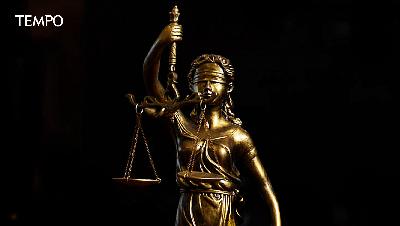
With the Supreme Court’s judicial mafia, when one branch is lopped off, another 10 grow in its place. It needs to be comprehensively cleaned up.
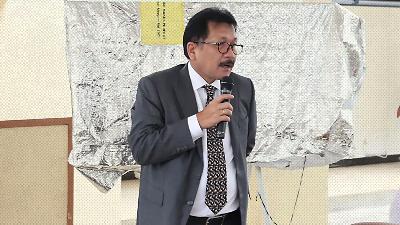
Judge bribery suspect Zarof Ricar was once a high-ranking Supreme Court official. He bankrolled a film about a judge.

The Supreme Court dismissed three judges suspected of accepting bribes in the Ronald Tannur case. This adversely impacts efforts to improve the judiciary.

The three judges who acquitted Ronald Tannur often reported for ethics violations. Their bank accounts show transactions amounting to the billions.
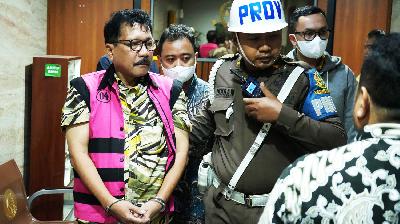
The Rp920 billion found in Zarof Ricar’s house is suspected of being related to arranging court case verdicts. The Corruption Eradication Commission once detected his corrupt exploits.
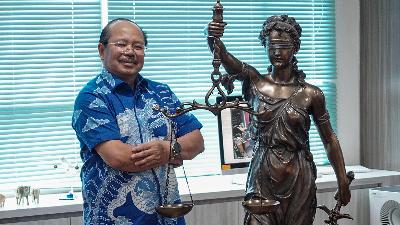
Judicial Commission Chair Amzulian Rifai on the corruption in judicial institution involving judges.

The food estate program, or rice field creation initiative in Central Kalimantan, was neglected and instead converted into oil palm plantations owned by private companies.

Ridwan Kamil’s electability remains stagnant in the Jakarta regional head election. His supporting parties are not actively campaigning for him, leaving him hoping for support from Prabowo and Jokowi.

Prabowo Subianto orders four ministers to rescue the bankrupt textile company Sritex. A potential bailout from the state is on the table.
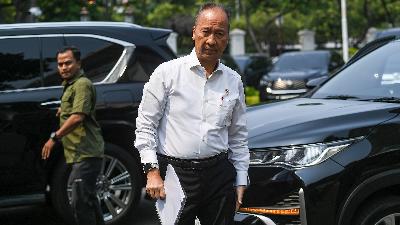
Interviews with Industry Minister Agus Gumiwang Kartasasmita and Sritex President Commissioner Iwan Setiawan Lukminto on the company’s bailout.

Cartoon: Yuyun Nurrachman

After Sritex, other major textile companies are also collapsing. Incentives and support are needed to curb imported goods.

Capital outflow becomes increasingly clear at the outset of Prabowo’s administration. The large cabinet undermines investors’ confidence.

Kamala Harris champions women’s legal and political rights, countering Donald Trump’s machismo.

Former Trade Minister Thomas Lembong is arrested by the Attorney General’s Office over corruption allegations. When will other ministers be questioned?

Prabowo Subianto is hoping to erase his sins in relation to the 1998 kidnappings. Gross human rights violations will not be a priority.

The obligation to obtain halal certification leads to higher economic costs and corruption. Labeling products that are non-halal would be more efficient.

Jokowi’s son-in-law, Bobby Nasution is caught up in alleged bribery involving a mining permit in North Maluku. He is accused of selling his influence.
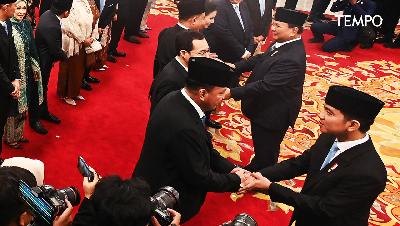
A number of problematic individuals are appointed to Prabowo Subianto’s cabinet. It will be difficult for the government to be effective in its first one or two years.
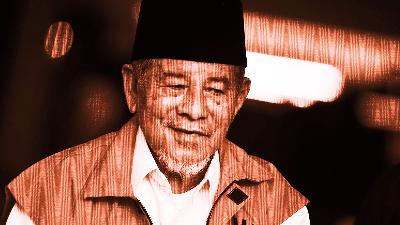
The term “Medan Block” emerged during the trial of former North Maluku Governor, Abdul Gani Kasuba. Medan Block is believed to refer to pre-allocated nickel mining concessions in Halmahera.
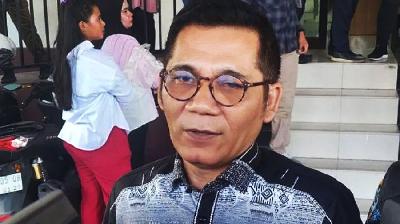
Former North Maluku Governor Abdul Gani Kasuba acknowledged meeting with Bobby Nasution but claimed he gained no advantage from it.
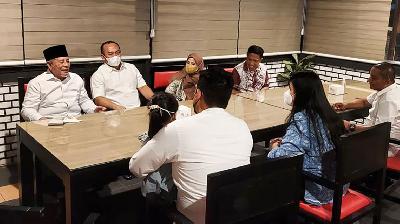
Bobby Nasution is suspected of managing the Medan Block nickel mine since 2021. He met with Abdul Gani Kasuba before becoming the Mayor of Medan.
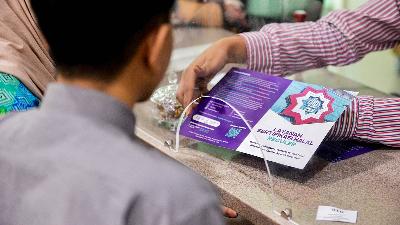
Entrepreneurs complain about the costly and complicated halal certification process. They must pay monthly fees for supervision.

Halal certification is slow due to inadequate supporting infrastructure. It has the potential to trigger a high-cost economy.

Entrepreneurs are pressured by the mandatory halal certification regulations. The costs associated with obtaining halal labels are considered expensive, and the procedures are complicated.
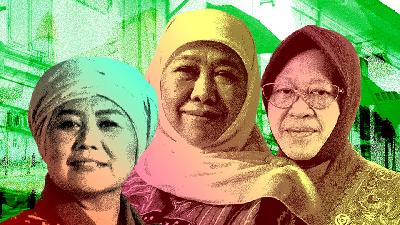
Three East Java gubernatorial candidates—Luluk, Khofifah, and Risma—talk about the competition in the 2024 regional head elections.
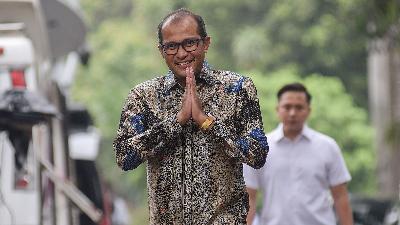
Prabowo Subianto appointed ministers and deputy ministers with problematic backgrounds in his cabinet. Several of them are closely associated with businessman Haji Isam.
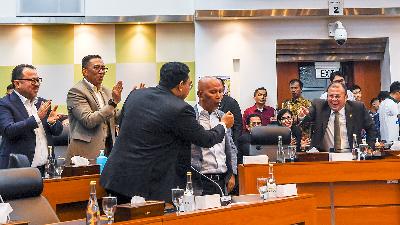
The PDI-P received the most positions as leaders of the DPR working bodies. Surya Paloh met with Bahlil Lahadalia to discuss the allocation of commission chairs.

The new ministries and agencies established by Prabowo Subianto cannot operate immediately. Some lack office space, have tight budgets, and are short on staff. The authority of the Haj and Umrah Organizing Agency even violates the law.

The rupiah is weakening amid the power transition, with global factors also exerting heavy pressure.

The new government under Prabowo Subianto is already formed. Can we hope for what the future holds?

Driven by corporate demand, helicopter business opportunities continue to grow. Operators are increasingly expanding their fleets.

The phrase “human rights” was lost from Prabowo Subianto’s inauguration speech.
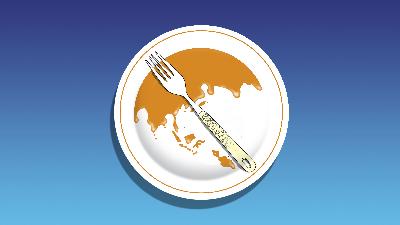
Food, like language, clothing, and customs, is a marker of our roots. Especially in the past.
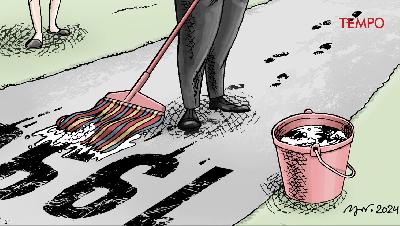
Cartoon: Yuyun Nurrachman
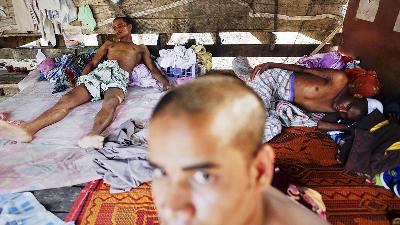
Rohingya refugees in Thailand, Malaysia, and the Philippines are treated differently than those in Indonesia.
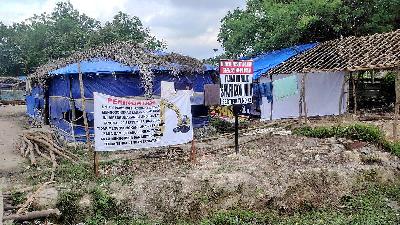
The Rohingya refugees living in Pekanbaru have more freedom to move around and reside in lodgings. Their children can also attend school.

The increasingly overcrowded refugee camps demand improvements in the mechanisms for handling Rohingya refugees. The number of refugees continues to rise.

Several Rohingya refugees successfully built their careers in various fields. They continued to work and raised awareness about the plight of displaced Rohingya refugees.
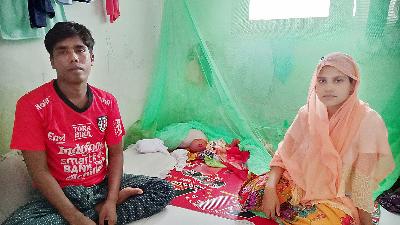
Rohingya refugees are still living in several inadequate temporary shelters in Aceh.

There are indications of problems with the IPO of Barito Renewables Energy. The stock exchange and capital markets authorities are neglecting their responsibilities.

There is an increasingly real threat to Indonesia’s biodiversity. It cannot be overcome through empty slogans at international forums.

The KPK should designate Sahbirin Noor a fugitive. There is a good chance the South Kalimantan Governor will go free.
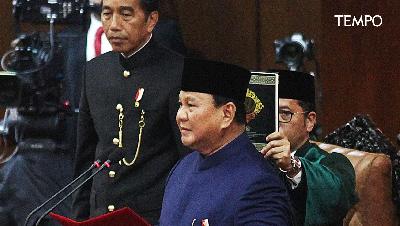
How did Prabowo Subianto decide on the composition of his cabinet? There are indications that several prospective ministers were proposed by tycoons.

Prabowo Subianto is inheriting an inefficient economy. Yet his new administration is likely to follow Jokowi’s economic model.
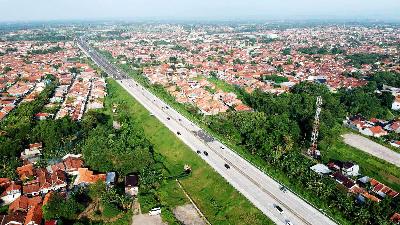
The Joko Widodo administration leaves a heavy burden for state-owned enterprises. Many projects result in big debts.
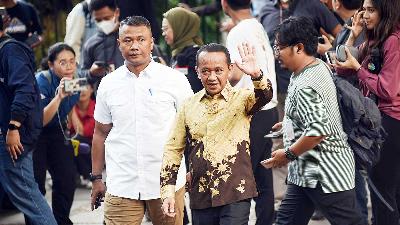
President Jokowi entrusted his confidants to join Prabowo’s cabinet. Several ‘volunteers’ also received positions.

Prabowo Subianto formed a large cabinet to accommodate the interests of parties, businessmen, and his supporters. Mining entrepreneur Haji Isam is suspected of proposing several ministerial candidates.
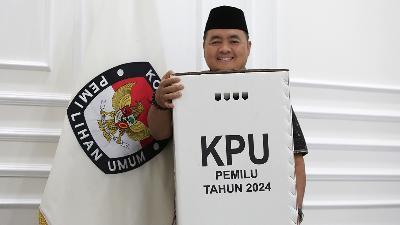
KPU Chair Mochammad Afifuddin on turbulence within his institution following the dismissal of Hasyim Asy’ari, and the Constitutional Court’s decision on the regional head elections.
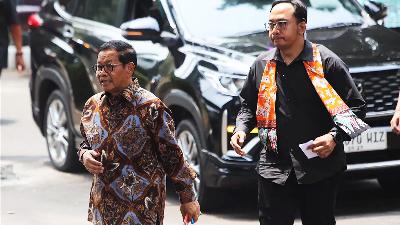
Megawati reportedly did not approve of PDI-P cadres entering Prabowo’s cabinet. She chose Pramono Anung to communicate with Prabowo.
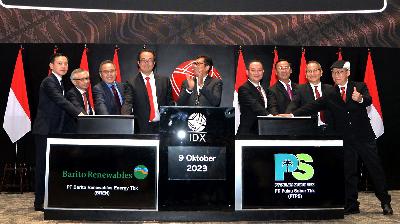
The Stock Exchange detects alleged violations in the IPO of Barito Renewables Energy. There are indications of maneuvering around public shareholding requirements.
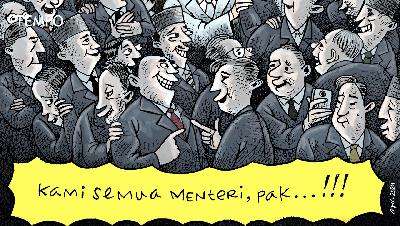
Cartoon: Yuyun Nurrachman
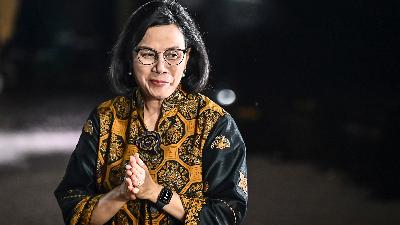
Sri Mulyani and several economic ministers from Jokowi join Prabowo’s cabinet, with encouragement from two former presidents.
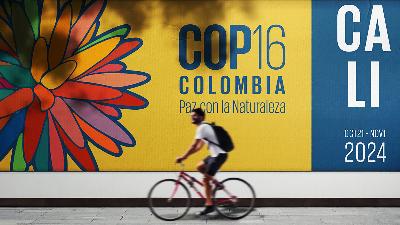
Indonesia’s delegation at COP16 CBD in Cali, Colombia, is not led by a minister. Biodiversity funding is at risk of not being agreed upon.

South Kalimantan Governor Sahbirin Noor is suspected of receiving commissions on three projects in the e-catalog. He has not been seen since being named a suspect.
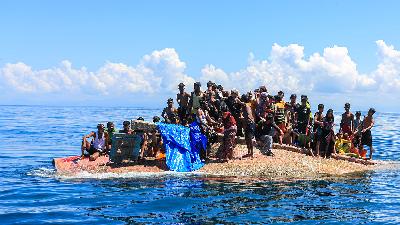
Uncertain future looms over Rohingya refugees in Indonesia. They are also struggling with various limitations.

Empathy is the key to happiness. We are happy when we help others, we are happy when we do good.

OJK’s right of reply and a remembrance to Mochtar Lubis who wrote about government.

The KPK uncovered alleged embezzlement of the Taspen pension fund involving Sinarmas Sekuritas. The result of poor supervision by the OJK.

A number of policies from Minister Sakti Wahyu Trenggono are riddled with conflicts of interest. They benefit his son, Indra Trenggono.

There are indications that the selection of the KPK leadership for the 2024 to 2029 period is in breach of a Constitutional Court ruling. The process needs to be rerun.
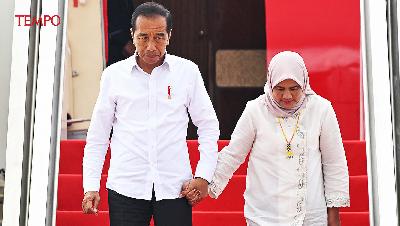
Jokowi is like a king reluctant to relinquish his crown. Nearing retirement, he is still trying to improve his image.

A reader’s letter suggests authorities seek ways for safe and efficient logistics transportation, in order to minimize traffic accidents.

Farwiza Farhan, the winner of the 2024 Ramon Magsaysay award talks about conservation of the Leuser Ecosystem in Aceh.
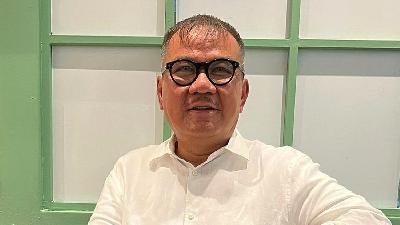
The KPK Leadership and Supervisory Board Selection Committee claimed to have followed procedures, and Jokowi reportedly did not intervene.
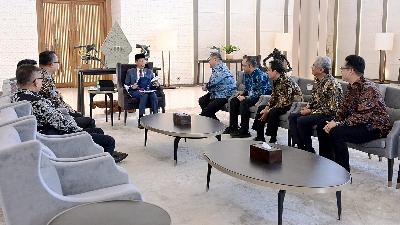
Various parties from the National Police Chief to the State Palace are accused of interfering in the KPK leadership candidates selection process. The candidates are divided into four clusters.

The KPK is investigating Taspen’s investment losses. Sinarmas is behind the transaction.

The family members of some ministers enter the fishery business. Other problems, such as the activity of illegal foreign vessels and the abuse of crew members, still prevail.

Explanations from State Secretary Minister Pratikno and Maritime Affairs and Fisheries Ministry on fishery business and the case of illegal ships in eastern Indonesia.
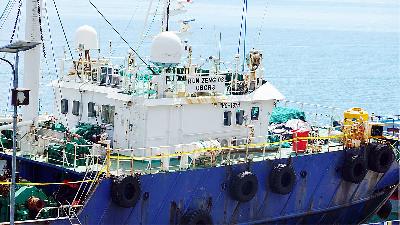
Illegal fishing and slavery continue to occur in Indonesian waters. Crew members are vulnerable to abuse.
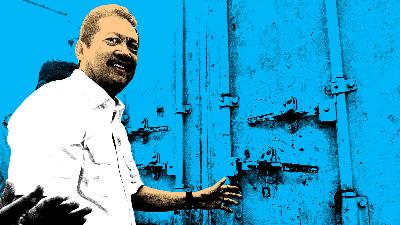
Minister Sakti Wahyu Trenggono revives a shutdown port. There is indication that the minister’s son is involved in the fisheries business.
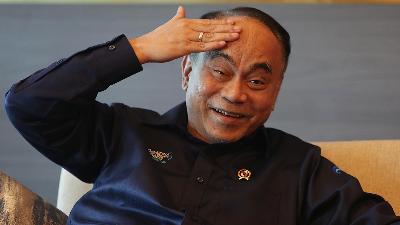
Tempo’s interview with Minister of Communication and Informatics Budi Arie Setiadi about Jokowi’s campaign before the end of his tenure.
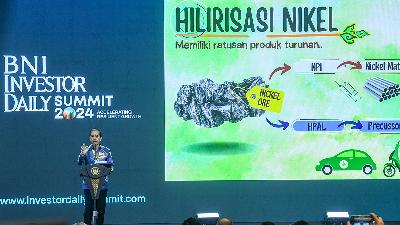
Jokowi’s campaign promoting his successes is considered as not portraying actual conditions. Customary communities are among the victims of his administration.
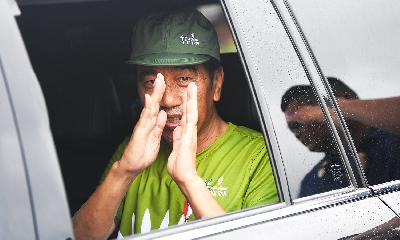
After stepping down, Jokowi will return to Solo, accompanied by his loyal supporters. He is not having a lavish farewell in order to avoid any negative sentiment.

As President Jokowi's term neared its end, instructions were given to promote the government's achievements, and billions of rupiah in contracts were offered to the media.

The market showed no positive reaction ahead of Prabowo Subianto's government, which was held back by the high amount of debt.

Life is not always about science and philosophy. This is where literature shows its value.
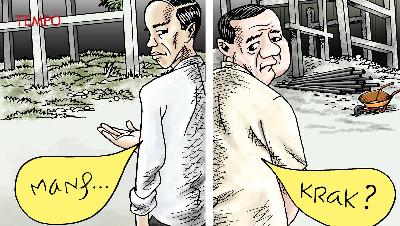
Cartoon: Yuyun Nurrachman
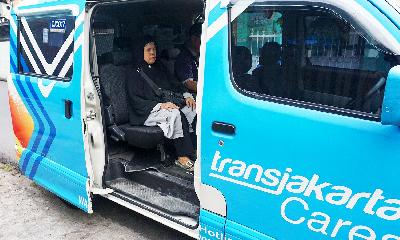
Jakarta's regulations were considered as failing to fulfill the aspirations of differently-abled people
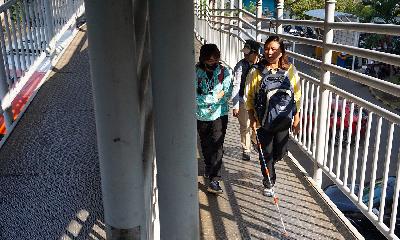
Tempo accompanied several differently-abled people as they navigated public transportation in Jakarta.
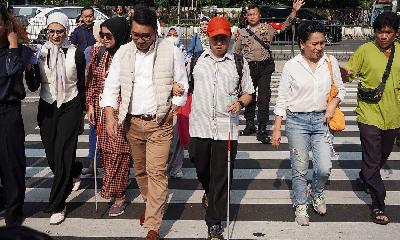
Jakarta governor and deputy governor candidates promise improvements in inclusive public transportation.
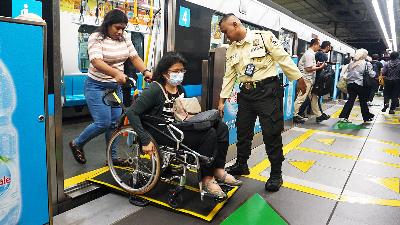
Jakarta is striving to provide inclusive transportation, but challenges remain, from funding issues to construction oversight.
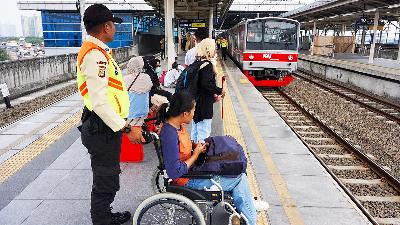
Despite some improvements, much still needs to be done regarding access to public transport for people with disabilities.

Officials are all trying to avoid responsibility for illegal gold mining in protected forests. The dangers to the environment and to health are being ignored.

Instead of paying its debts, the Bakrie Group is suing 12 creditors. This could become a bad precedent for the investment climate.

The contest for the selection of the Supreme Court Chief Justice is heating up. There are indications it is riddled with the interests of the government and tycoons.
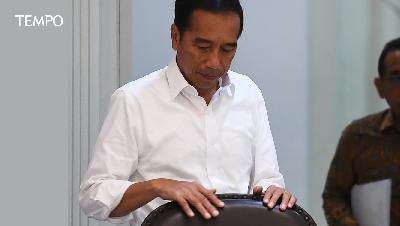
Jokowi passed a number of strategic policies at the end of his administration. Making the president-elect a hostage to fortune.

Illegal gold mines that collapsed in Solok Regency, West Sumatra, damage the Batanghari watershed. Authorities are suspected of protecting investors.
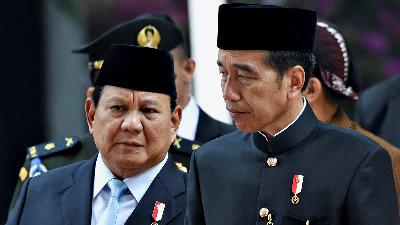
Before Jokowi’s term ends, the Presidential Palace is maneuvering to provide cover for Gibran. This includes erasing traces of the Fufufafa account as well as interfering in the formation of Prabowo’s cabinet.
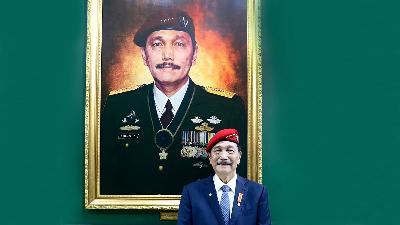
Luhut explains his close ties with Jokowi, and the plans of the president-elect Prabowo. This is his first interview with Tempo after the one on the Panama Papers eight years ago.
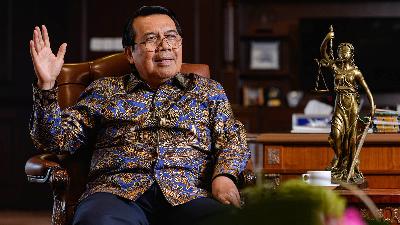
Supreme Court Chief Justice Muhammad Syarifuddin uses artificial intelligence to handle cases. Case brokers continue to be a threat.
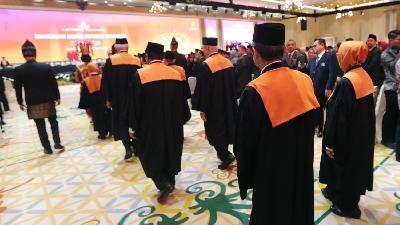
The race for the position of Chief Justice of the Supreme Court is heating up amid a flurry of allegations against certain candidates. There is suspicion of backing from business circles.

Indonesia and other countries continue to oppose the European Union’s Deforestation Regulation. The European Commission proposes a delay.

VIVA Group is facing a restructuring process under a debt payment suspension scheme and is threatened with bankruptcy. There are maneuvers to lobby creditors and reduce debt.
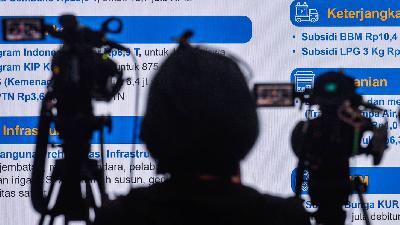
Media companies are experiencing upheaval due to the rapid changes in the business landscape. The industry is moving towards a new equilibrium.
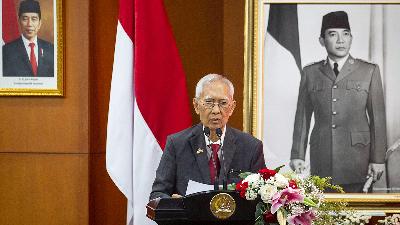
President Joko Widodo is suspected of supporting the restoration of Suharto’s name, with a possibility of being declared a national hero.
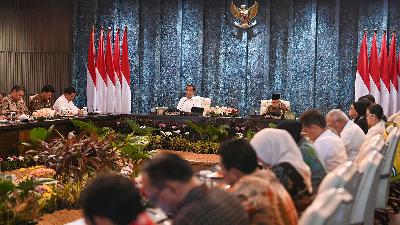
Jokowi is preparing for the incoming Prabowo-Gibran administration starting in late February 2024. He hopes that Prabowo can continue his programs.
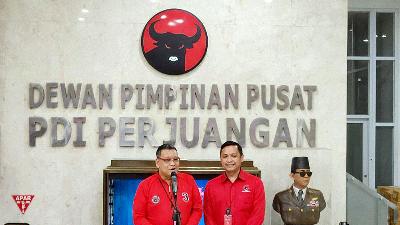
Political parties replace elected legislative members over alleged vote manipulation.

Political parties that supported the Prabowo-Gibran presidential ticket plan to form a permanent coalition for the 2024 regional head elections. They are strengthening themselves in the provinces.
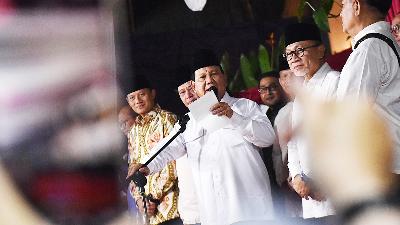
Prabowo’s cabinet is expected to be filled with many party cadres. Jokowi and other officials from the coalition of parties supporting Prabowo-Gibran already floated a number of names.
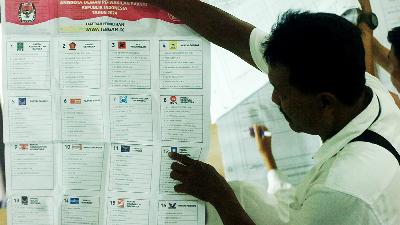
A number of political parties may not make it to Senayan if they fail to meet the parliamentary threshold. These parties are on a limited campaign budget and do not have enough witnesses.

The political parties supporting Prabowo are continuing to do so despite the nomination of Gibran for vice-presidency is proving problematic. They are simply after power.
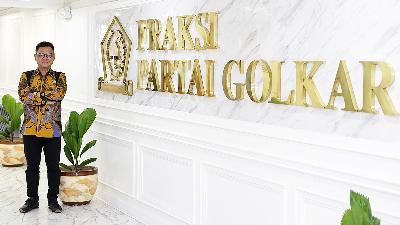
A number of Reformasi movement activists joined political parties after Suharto fell. They are close to party leaders.
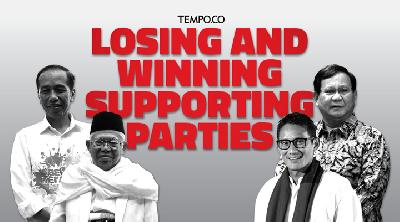
Joko Widodo-Ma’ruf Amin and Prabowo Subianto-Sandiaga Uno’s candidacies will impact their supporting parties in the 2019 general election.
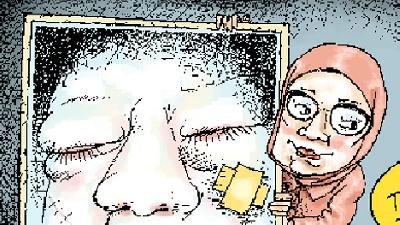
She’s a Modern Day Kartini!
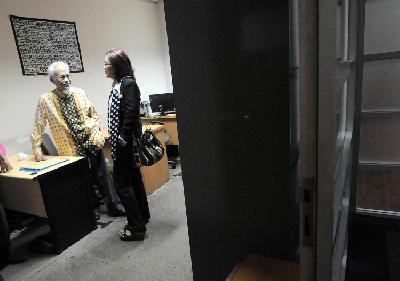
Many politicians have been changing parties in order to increase their chance of entering the House of Representatives. It indicates a failure by those parties to prepare their candidates.

An Indonesian citizen participated in a simulation of life on the Red Planet, held in a desert in Utah, United States. The simulation is meant to assess Mars’ feasibility for permanent habitation.

State funds for political parties will rise almost tenfold. This needs close monitoring.

Gunarti, a farmer and activist in the Kendeng Mountains Community Network, seems hesitant to be compared with Kartini, even though she shares the same birthday on April 21, as the inspiring national hero. She is now well-known for her leadership in the green movement to oppose the proposed construction of Semen Indonesia's cement plant in Rembang, Central Java. She believes the plant will endanger existing ground water springs and impact the larger issue of food security there. "It's better to have a cement shortage rather than a shortage of food," Gunarti, 43, says adamantly.

Managements of online, application-based transportation services agreed with the government's decision to apply a baseline rate effective April 1. "We are applying [the regulation] with fairness, as well as safety, in mind. There will be quotas and baseline rates. We believe all parties will comply and agree to follow the regulation we have drafted," Transportation Minister Budi Karya Sumadi said last week.

The plan by the House of Representatives (DPR) to revise the Broadcasting Law by slipping in a provision on special broadcasting bodies that could be owned by political parties must be opposed by all. Besides contradicting the fundamental principal that frequency bands be managed for public benefit, this proposal would only make matters worse in the already chaotic world of broadcasting.

A novel by Martin Suryajaya, titled Kiat Sukses Hancur Lebur (Success Tips for Destruction, 2016), is now in circulation. The titles irony can immediately alienate potential readers.

When she was interviewed two weeks ago, Kartika Jahja, 35, could not conceal her dejection. Wearing a leather jacket and a bright red skirt, this singer tried to understand her recent catastrophe in Yogyakarta. There, she had failed to carry out her project of staging the 2016 Lady Fast event, after one mass organization had raided it and forced it to close down. "The reason for it was not clear at all," she said.
Lady Fast was initially to present a series of events about women's issues. The agenda included discussions, a workshop, film screening and musical performances. A day into the event, a group from one mass organization, accompanied by the police, came and disbanded the event. After that, Tika and members of the Kolektif Betina (Female Collective) as the organizer of the event, had to deal with the local police.

There was no red carpet or snapping cameras on a glittering stage when Sely Martini won the Honesty Oscar from ONE.org and Accountability Lab. This award was announced by the two agencies involved in transparency issues through the Twitter account @ONEcampaign on March 2, 2014, coinciding with the other Oscar awards given to Hollywood starts in the United States.
Sely, 38, a resident of Bandung, West Java, secured the award in the category of Best Activist. She won over anticorruption activists from various countries like John Gitongo (Kenya), Aruna Roy (India), Gregory Ngbwa Mintsa (Gabon) and Xu Zhiyong (China). "Even being just nominated would have made be happy as it means my activity is being acknowledged by others," Sely told Tempo at the ICW office in South Jakarta two weeks ago.

Emancipation means being freed from all shackles. Almost a century and a half ago, the struggle of Dewi Sartika and R.A. Kartini was limited to women's right to education. We still feel the fruits of their struggle to this day. Women now have extensive access to education, from elementary school to university.
But, in the words of poet Chairil Anwar, "The work is not yet done, there is nothing yet." According to data released by the Central Statistics Agency (BPS), only 10.5 percent of urban women graduated from university in 2015. In the countryside, the figure was even worse: less than 3.3 percent. The figures were about the same for men. This means the road to educational emancipation is still long for both sexes.

Various traditional and cultural rituals in Indonesia can be quite expensive to carry out. Among the people of Toraja in South Sulawesi, for example, one traditional ceremony can cost billions of rupiah. Getting out of such rituals is not easy, although many communities around the country are determined to let go of certain traditional requirements that can often impoverish them, such as the villagers of Borokanda, at Ende Lio, Flores.
Director of Religion and Traditional Faith at the Education and Culture Minister, Sri Hartini, said that a simplification of rituals can be achieved through deliberations without reducing the substance of tradition. "Only the superficial aspect is simplified," she told Tempo English reporters Isma Savitri and Dahlia Rera in an interview, three weeks ago. Excerpts:

The 33rd Nahdlatul Ulama (NU) Convention in Jombang, East Java, in early August will be a nostalgic journey for Martin van Bruinessen, who spent considerable time in Indonesia during the 1980s and 1990s. As a resource person at the pre-convention discussions, Bruinessen, the Dutch professor from Utrecht University, author of a number of books on Islam in Indonesia, was sought after to speak on the future direction of the the NU, currently led by KH Said Aqil Siroj.
In the opinion of Dutch anthropologist Bruinessen, the NU has an important role to play in society. He knows his subject matter well, given his nine years in Indonesia. Although he now resides in the Netherlands, he still devotes much of his time to Islamic literature, in the form of discussions and studies on intellectual development in Indonesia. This has led Bruinessen to deepen his knowledge on Islamic thinking in Indonesia, and that of the NU.

THE new mining law has left Martiono Hadianto, chairman of the Indonesian Mining Association and CEO of Newmont Nusa Tenggara, wondering. "What is the government's objective?" he asked. He argues that the law is not aligned with President Joko 'Jokowi' Widodo's speech at APEC, which was to invite more investors to Indonesia. Martiono recently shared his views on the current mining conundrum to Tempo English journalists Sadika Hamid and Amanda Siddharta.

TO Dyah Kartika Rini Djoemadi, coordinator of Jokowi's Advanced Social Media Volunteers (Jasmev), the 2014 presidential election was a chance to prove themselves. Determined to totally focus on the task ahead, Kartika took a three-month leave from Spindoctors Indonesia, the political strategy and public policy consulting firm she founded, to devote all of her time to Jasmev. Not surprisingly, until the actual election day on July 9, DeeDeeas Kartika is better knowncould be found in the Jasmev war room in a building at Gondangdia, Central Jakarta.
There DeeDee, 34, coordinated the activities of 150 volunteers, who worked in three shifts. Each of them employed a laptop in their operations to ensure Joko Widodo was elected president. "I had to monitor the war room every day. Doing it part-time would not have been effective," she told Tempo in Jakarta two weeks ago.

The plan was hatched in late October at the Great Indonesia Movement (Gerindra) Party's meeting room at the Jakarta Legislative Council (DPRD). In attendance were representatives from the parties that supported Prabowo Subianto's failed bid for the presidency in July. The agenda: formulating a strategy to frustrate Basuki Tjahaja 'Ahok' Purnama's ascent to the seat left by Joko Widodo when he became president.
Around 15 people from five factions were present at the time. They included DPRD Deputy Speaker Abraham Lunggana, a United Development Party (PPP) politician, and Justice and Prosperity Party Deputy Chairman Triwisaksana as well as representatives from the Democrat Party, the National Mandate Party (PAN) and the Golkar Party.

THE cool mountain air grew cold with the rain in Salimpek village, Solok regency, West Sumatra. But the weather did not keep residents from congregating around a small plot of land, about the size of a volleyball court, next to wet onion fields in late August. They were too curious to witness something they had never seen: a fight between a local silek master-silek is Minang for silat, which refers to the martial arts indigenous to Indonesia and Malaysia-and a tall, large European man.
Yes, on that day, Sasaran Kincia Tuo, a silat school at 1,455 meters above sea level, was visited by seven European guests who came to test their martial arts skills. In the Minang language, sasaran means 'a place for martial arts training', and kincia tuo 'old mill'. The foreigners were participants in the 2014 Minangkabau Silek Camp, held from August 20-28. Beginning in Talang Babungo village, some 10 kilometers away from Salimpek, these masters from abroad set about learning some new moves and burnishing their old ones.

Several parties are actively organizing cadre training in preparation of the April 9 legislative elections. Artists and sports stars are being turned into vote-getters.

Kartini enjoyed close relationships with a number of people, despite her social confinement: with pen-pal Stella Zeehandelaar in Holland, Jacques Abendanon, a Dutch East Indies official and his wife Rosa, and Marie Ovink-Sour, wife of the Jepara assistant resident.

The current system of verifying political parties runs against the law. The legality of the 2014 General Elections may be in question.

Kyai Sholeh Darat pioneered the translation of the Qur'an into Javanese. He presented Raden Ajeng Kartini with the translated work.

The Reform Star Party grew out of the United Development Party. Constant conflicts between party administrators have beset both parties.

Sutiyoso claims to be unwilling to establish a party as a vehicle to contest the presidency. Uniquely, a number of parties admit to consulting with and receiving “entitlements” from him.

Rules of the 2009 General Elections will change. Small parties can be eliminated.

Kartika is an eyewitness to Affandi’s journey. The strong influence of her father over her paintings was inevitable. However, within the last year, she has produced different works, with special objects.

The result of the March survey by LSI in Nanggroe Aceh Darussalam shows that most of the people there yearn for the establishment of local parties.

The government deletes an article on local parties in the Aceh Government Bill but foreign observers stay is extended.

In several regions candidates of major parties failed in regional elections. The PDI-P was quite satisfied, while Golkar was below its target.

Burhanuddin Abdullah has been elected BI Governor. Will political parties submit invoices for services rendered?

Indonesia is the largest Muslim country in the world and host to many Islamic political parties. Yet general elections are always won by non-Islamic parties.

Both the PPP and PBB parties feel that Akbar Tandjung should not have to resign from his position as House speaker. Why do these two parties appear to be defending Akbar?
Independent journalism needs public support. By subscribing to Tempo, you will contribute to our ongoing efforts to produce accurate, in-depth and reliable information. We believe that you and everyone else can make all the right decisions if you receive correct and complete information. For this reason, since its establishment on March 6, 1971, Tempo has been and will always be committed to hard-hitting investigative journalism. For the public and the Republic.